Wisdom Tooth Extractions – Lebanon, NH
Protect Your Oral Health Through Wisdom Tooth Extractions
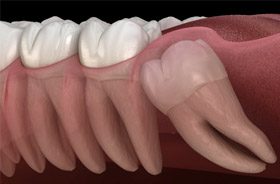
An average adult human has 32 teeth, including four wisdom teeth, which develop a bit later in life (usually during the teenage years). Unfortunately, most people’s mouths are too small to accommodate these third molars, which can lead to serious oral health complications. To prevent such issues and protect the dental and overall well-being of our patients, we offer wisdom tooth extractions in Lebanon.
Problems with Wisdom Teeth

Wisdom teeth can lead to a number of serious problems, including:
- Overcrowding. Due to a lack of space, the wisdom teeth may cause overcrowding in the mouth. They can push the adjacent teeth out of their proper positions, leading to misalignment and bite problems.
- Damage to nearby teeth. Since the wisdom teeth are so far back in the mouth, it may be difficult to keep them clean. When food particles and bacteria get stuck between a wisdom tooth and the molar next to it, both teeth are at a higher risk of decay.
- Infection. Wisdom teeth that are fully or partially impacted (stuck beneath the gum line) are at a higher risk of infection than other teeth. The surrounding bone may suffer damage as a result. Dental infections can also lead to systemic illness.
Who Should Undergo Wisdom Tooth Extractions?
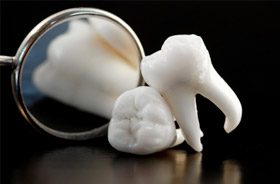
Not everyone needs to have their wisdom teeth removed. In fact, there are some individuals who can retain their third molars for a lifetime and suffer no ill effects. More often, however, extraction is necessary. During your regular checkups, we will keep an eye on your wisdom teeth. If we believe they are causing problems, or that they may cause problems in the future, we will recommend that you undergo oral surgery to have them removed.
Even though most people who have their wisdom teeth extracted are young adults, there is no age limit for the procedure. Sometimes, older individuals find that their third molars are beginning to cause them pain and thus should have them removed.
The Removal Process
We use local anesthetic and sedation to make sure our patients are comfortable during the wisdom tooth removal process. You should feel little to nothing while our on-staff oral surgeon, gently extracts the teeth. We may have to create an incision in the gums and/or break the teeth into pieces in order to take them out.
It’s normal to experience some swelling and soreness after the procedure. However, we’ll give you detailed postoperative instructions to minimize your discomfort and keep your risk of complications as low as possible. We may also prescribe painkillers and antibiotics. The soft tissue at the extraction site should heal fairly quickly; within a few days to a week, it is likely that you’ll be able to resume your normal routine. If you have any questions or concerns during your recovery period, you’re welcome to call us as your dentist in Lebanon.
Could your wisdom teeth use a checkup? Contact Santavicca Dental Professionals to schedule an appointment with our team of oral health experts.
Understanding the Cost of Wisdom Tooth Extractions
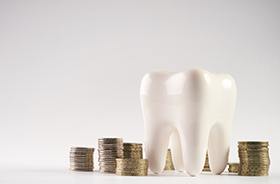
The cost of wisdom tooth extractions varies from case to case. It depends on a few different factors. When you visit us for your consultation, we will be able to discuss specific numbers. We will also help you learn about your payment options. For example, your procedure might be partially covered by insurance, or you may be eligible for low-interest financing. We want the process of paying for your care to be as low-stress as possible.
Factors That Can Impact the Cost of Wisdom Tooth Extractions
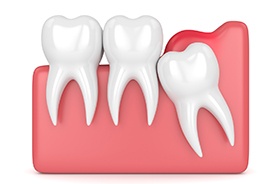
Some factors that can have a bearing on the price of wisdom tooth extractions include:
- The number of wisdom teeth that need to be removed. Not everyone has four wisdom teeth. Some patients have more or fewer. Also, some patients choose to keep one or more of their wisdom teeth and only remove the ones that are posing an immediate threat to their oral health.
- Whether or not the wisdom teeth are impacted. Impacted teeth are stuck beneath the gumline, so removing them can be somewhat complex. They cost more to remove than teeth that have fully erupted from the gumline. The type of impaction involved can also influence overall costs.
- The type and amount of sedation used. We strive to make our patients comfortable. We offer different types of sedation at varying price points.
- The dentist who performs your surgery. A specialist may charge more than a general dentist who has been trained to remove wisdom teeth.
Does Dental Insurance Cover Wisdom Tooth Extractions?

You will need to check the details of your unique insurance policy to find out how it applies to wisdom tooth removal. Often, this procedure is classified as an oral surgery, which is a major service that may be 50% covered, up to the amount of your plan’s annual maximum. Our team is in-network with many insurance plans, and we will be happy to help you navigate your benefits so you can get the most out of them.
Other Options for Making Wisdom Tooth Extractions Affordable
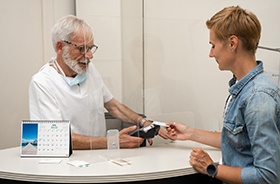
In addition to insurance, there are a few provisions that may make it easier for you to afford your wisdom tooth extractions:
- CareCredit offers low-interest payment plans for qualified patients. After a quick application, most patients are found eligible for financing.
- Essential Dental Plan. This discount plan provides reduced fees on most of the services available in our practice.
Are you ready to learn more about wisdom tooth extractions and their cost? Get in touch with Santavicca Dental Professionals today. We look forward to serving you.
Wisdom Tooth Extractions FAQs
Why Do We Have Wisdom Teeth?
In modern times, wisdom teeth can cause a lot of trouble. For ancient humans, though, these teeth may have been absolutely vital. Many years ago, people subsisted on a rough diet that included things like leaves, roots, and raw meats. As you can imagine, such items can take a toll on dental health. The wisdom teeth, the third set of molars, were important for providing extra chewing power so ancient humans could get the nourishment they needed.
Today, modern eating utensils and food processing systems have made it much easier for us to consume a wide variety of meals. We no longer need wisdom teeth to thoroughly chew our food.
Does Everyone Have Wisdom Teeth?
Most people develop four wisdom teeth sometime in their teenage years. However, some people never get any wisdom teeth at all! The reason behind this may simply be due to genetics.
Keep in mind that even if you cannot see or feel your wisdom teeth, that does not necessarily mean they are not there. They may not have developed yet, or they may be stuck beneath your gumline. Our team can let you know for sure whether you have your third molars.
Is Wisdom Tooth Removal Painful?
Patient comfort is of utmost importance to our team, so you can expect us to thoroughly numb your mouth before we start working. If you feel anything, it should be slight pressure rather than real pain. In some cases, we administer sedation so our patients feel almost nothing during their procedure.
After the sedation and anesthesia wear off, some soreness and swelling are to be expected. Our team can provide detailed instructions to help you minimize such issues and enjoy a smooth recovery process. Most patients are back to feeling normal within a week or two.
What Is the Best Age to Get Wisdom Teeth Removed?
We often recommend wisdom tooth removal for patients in their late teens or early 20s. This is a good time for the procedure because it allows us to extract the wisdom teeth before they grow too long and become too firmly embedded in the jawbone. Younger people also tend to heal faster than older patients.
Of course, successful wisdom teeth removal can be performed on mature adults. We have helped many people in their 30s, 40s, and even older to benefit from this procedure.
